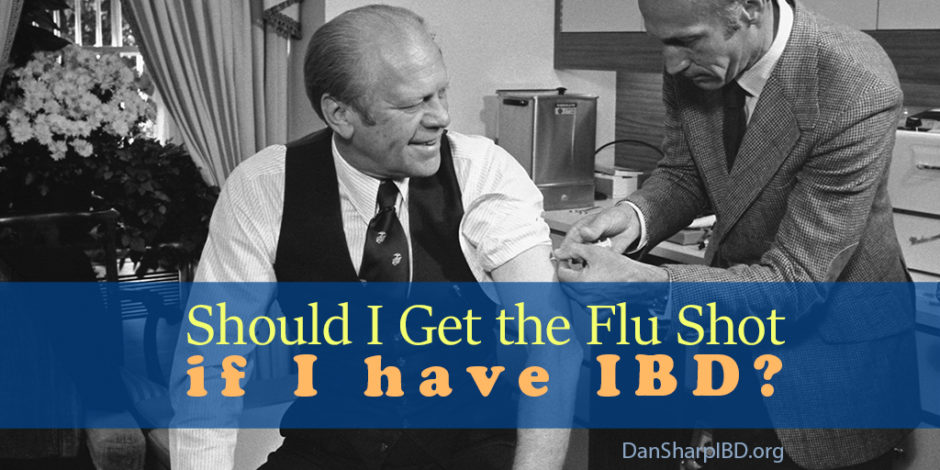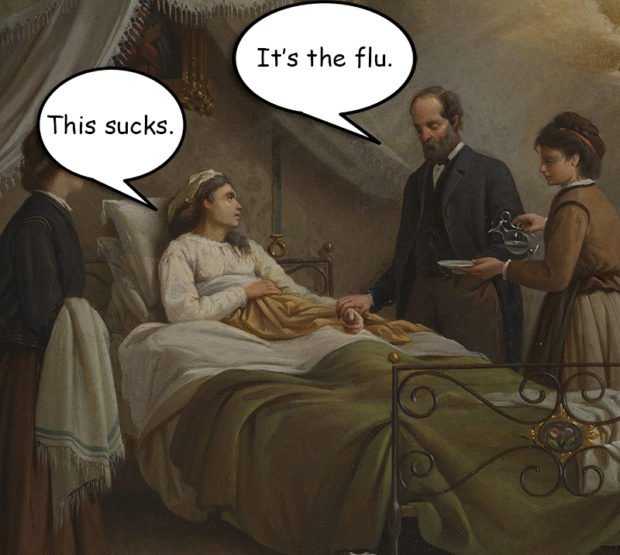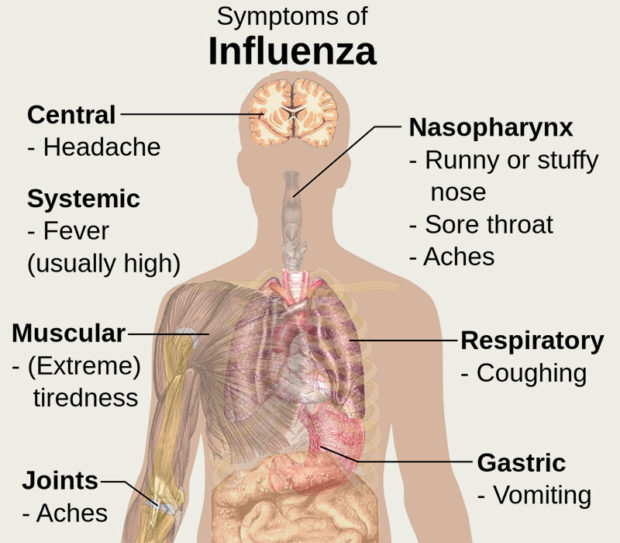
Should you get the flu shot if you have Inflammatory Bowel Disease (IBD)? The answer is Yes! There are some rare exceptions so, as with all your medical decisions, you should speak to your physician about this if you have any questions or concerns. Ideally, he or she has already spoken to you about the flu shot.
While most people are recommended to receive a yearly flu shot, it is particularly important for those with chronic illness and those taking immune-suppressing medications (such as IBD patients). In fact, if there is ever a shortage of flu shots available, IBD patients are one of the groups that will be given priority access to the shots. 1http://www.cdc.gov/flu/protect/whoshouldvax.htm#annual-vaccination 2http://www.med.umich.edu/ibd/education/vaccinations.html There are, unfortunately, a lot of misconceptions and even fears about flu shots. Fortunately, with some basic information, those misconceptions can be avoided and changed.
It is well understood among expert IBD physician researchers that flu shots are an important part of an IBD patient’s overall care. For instance, a yearly flu shot is part of the Cornerstones IBD Checklist, an “industry standard inflammatory bowel disease (IBD) checklist[…] for the appropriate management and care of […] inflammatory bowl disease patients.” 3http://cornerstoneshealth.org/#home-page4http://cornerstonehealth.freshframework.com/wp-content/uploads/2016/08/CSH_Checklist_MonitoringAndPrevention_Final.pdf Cornerstones Health, Inc. is a nonprofit organization founded by leading IBD experts Marla Dubinsky, MD and David Rubin, MD. They and their faculty are dedicated to the dissemination of best treatment practices for IBD patients. However, while they work to disseminate best treatment practices, such as helping patients stay up-to-date on vaccinations, many physicians and clinics may not be diligent enough at keeping their patients up-to-date. That, combined with the undue fear and misunderstanding among some patients, leads to simply not enough IBD patients being adequately protected against the flu.
A 2006 paper from the American Journal of Gastroenterology found that, despite being a high-risk group, only 28% of IBD patients surveyed were regularly receiving a flu shot. 5https://www.ncbi.nlm.nih.gov/pubmed/16817843 6https://www.ncbi.nlm.nih.gov/pmc/articles/PMC3093688/ There were two primary reasons that patients did not receive flu shots. The first was lack of awareness; patients simply did not know it was recommended. The other reason was concern about side effects; a concern that can be resolved with a little education.
While both gastroenterologists and primary care physicians should be informing patients on the importance of the seasonal flu shot, and following up with them to make sure they are staying up-to-date, it is crucial for patients to take the initiative when they can. As patients, we have the most to gain or lose as our health changes, and the flu shot is an easy way to keep our health from moving in a negative direction.
Following are a series of questions that IBD patients may have about the flu shot. The first question is simply “Why should I get the flu shot if I have IBD?”. If you’d like to know more about the flu and the flu shot, especially as they relate to IBD, the other questions and answers should provide some additional insight.
You can find numerous citations throughout in case you and/or your physician would like to delve further into the information presented. As always, speak with your physician about any questions or concerns you have regarding your medical care.
Table of Contents
Why Should I Get the Flu Shot if I have IBD?
 IBD patients should get the flu shot for the same reason as anyone else: to help prevent being infected by the flu , to minimize the risk of serious infections and complications when a flu infection does happen, and to prevent the flu from spreading to others. However, IBD patients face an increased risk of serious infection and complications from the flu, which makes the seasonal flu shot all the more important for maintaining one’s health. 7http://www.medpagetoday.com/meetingcoverage/acg/42336
IBD patients should get the flu shot for the same reason as anyone else: to help prevent being infected by the flu , to minimize the risk of serious infections and complications when a flu infection does happen, and to prevent the flu from spreading to others. However, IBD patients face an increased risk of serious infection and complications from the flu, which makes the seasonal flu shot all the more important for maintaining one’s health. 7http://www.medpagetoday.com/meetingcoverage/acg/42336
The main reason IBD patients have increased risks is due to the necessity for medications that suppress the immune system in some way (given that IBD is an immune-mediated condition). 8https://www.ncbi.nlm.nih.gov/pmc/articles/PMC3533208/ 9https://www.ncbi.nlm.nih.gov/pmc/articles/PMC4363747/
According to Gil Melmed, MD, an IBD physician researcher with expertise in vaccine-preventable illnesses,
This risk should be considered, even when patients are not currently on any immune-suppressing or modifying medications. According to Dr. Melmed:
Other factors associated with IBD, such as malnutrition and inadequate sleep, may also contribute to increased susceptibility. 11https://www.ncbi.nlm.nih.gov/pubmed/24051931 12https://dansharpibd.org/what-is-the-difference-between-nutrition-and-diet/
Here is a quick run-down of the reasons why the flu shot is particularly important to IBD patients. The rest of the questions and answers in this article will provide additional insight into the importance of the flu shot for IBD patients.
- It is important for IBD patients to take precautions against the flu, as immune-suppressing medications and other factors associated with IBD can increase the risk for serious infections and complications. 13https://www.ncbi.nlm.nih.gov/pmc/articles/PMC3533208/ 14https://www.ncbi.nlm.nih.gov/pmc/articles/PMC4363747/
- Serious complications of the flu include pneumonia, bronchitis, sinus infection, and ear infection. In 2014, influenza and pneumonia are estimated to have killed 55,227 people in the US. 15http://www.cdc.gov/nchs/fastats/deaths.htm The World Health Organization estimates that between 250,000 and 500,000 people die each year from the flu, worldwide. 16http://www.who.int/features/qa/84/en/
- The flu shot is a safe way to gain immunity to various influenza strains and help prevent infection. It is much safer than developing immunity to the flu through an actual infection, as there is no way to become infected by the flu through a flu shot. 17http://www.cdc.gov/flu/about/qa/misconceptions.htm 18http://well.blogs.nytimes.com/2016/10/28/does-the-flu-provide-better-immunity-than-a-flu-shot/?smid=tw-share
What is the Flu Shot?

Thanks, Obama! No, seriously. Thank you, President Obama, for doing your part to increase herd immunity! 🙂
The “flu shot” is another way of referring to the seasonal influenza vaccine that is injectable and non-live (meaning it does not contain any live influenza viruses).
It is generally given through intramuscular injection, which means the needle is inserted into your muscle. The upper arm is a common location for injection.
Some other basic facts about the flu shot:
- It is a form of preventive medicine. 19http://www.flu.gov/prevention-vaccination/ 20https://www.ncbi.nlm.nih.gov/pmc/articles/PMC5016364/
- It is a vaccine, which means it teaches your immune system how to detect and fight off specific pathogens (in this case, certain strains of influenza virus).
- The particular strains of influenza that a flu shot covers is updated each year, based on predictions about what strains will be more prevalent and most important to provide immunity to.
- It is the single most effective means to preventing the flu from spreading. 21http://www.cdc.gov/flu/protect/preventing.htm 22http://www.who.int/mediacentre/factsheets/fs211/en/
For more information on vaccines, read on.
What is a Vaccine?

It’s the eye of the tiger. It’s the thrill of the *cough*…
A vaccine is a substance that “teaches” your body how to recognize and defend itself against dangerous pathogens (such as viruses or bacteria). 23https://medlineplus.gov/ency/article/002024.htm
Receiving a vaccine is sort of like putting your immune system through a Rocky-style training montage. It’s short and sweet, a lot of valuable lessons are learned, and afterwards, while Rocky is prepared to fight Ivan Drago to end the Cold War… get ready for it… your immune system is ready to fight a virus to end the Flu War! Great analogy, or the greatest analogy?
According to the National Institute of Allergy and Infectious Disease:
Flu shots, specifically, contain either an inactivated (killed) flu virus or no flu virus at all. 25http://www.cdc.gov/flu/about/qa/misconceptions.htm Either way, it is a safe way of teaching your body’s immune system how to fight the flu, without actually having to fight the flu.
Can’t I Just Let My Immune System Learn on its Own?
Receiving a flu shot is much safer than allowing one’s immune system to learn on its own. 26http://www.cdc.gov/flu/about/qa/misconceptions.htm 27http://well.blogs.nytimes.com/2016/10/28/does-the-flu-provide-better-immunity-than-a-flu-shot/?smid=tw-share It generally takes more than a week for a healthy person’s immune system to learn how to fight off an unfamiliar infection. Sometimes, stronger infections can spread faster than the immune system can fend them off. Even if a person’s immune system eventually overcomes the infection, they may go through weeks where they’re not only suffering, they’re putting the health and even lives of the people around them at risk. 28http://www.who.int/features/qa/84/en/
The flu shot teaches your immune system how to fight off infections by introducing it to inactivated (dead) and harmless forms of influenza. If you encounter the actual virus later on, your immune system will “remember” it and be more prepared to fight it, thanks to the vaccine. According to the World Health Organization,
Furthermore, the flu shot not only helps to protect the individual receiving it, it also helps to protect everyone else by minimizing the chance of the infection spreading. This is one reason why it’s very important for even perfectly healthy people to still get a seasonal flu shot; it helps to protect individuals at risk for serious infection and complications, such as IBD patients. 30http://www.niaid.nih.gov/topics/vaccines/Pages/whatVaccine.aspx
What is Influenza?
Influenza is a highly contagious viral respiratory infection of the nose, throat, and lungs. 31https://www.niaid.nih.gov/diseases-conditions/influenza It is commonly referred to as “the flu”.
Common symptoms of Influenza (the flu) include:
- Headache
- Fever
- Chills
- Tiredness/Fatigue
- Aching joints
- Runny or stuffy nose
- Congestion
- Sore throat
- Coughing
- Vomiting 32https://www.niaid.nih.gov/diseases-conditions/influenza
For many relatively healthy people, the flu may seem like more of an inconvenience than a serious threat. However, the flu is nothing to take lightly.
The Flu is Serious!
Here are some important facts about the flu:
- The flu spreads easily from person to person. 33https://www.niaid.nih.gov/diseases-conditions/influenza
- An infected person can spread the flu to others, even when they are not experiencing any symptoms. 34http://www.cdc.gov/flu/about/disease/spread.htm
- In most healthy individuals, the infection lasts about a week (although a cough may persist for longer). 35http://www.who.int/mediacentre/factsheets/fs211/en/
- In some people, it can lead to serious complications, such as pneumonia. 36https://www.niaid.nih.gov/diseases-conditions/influenza
- Some people are particularly at risk for more serious infections, complications, and even death. These include people over 65, children under 2, those living with certain chronic illnesses, and those with a suppressed/compromised immune system. 37http://www.who.int/mediacentre/factsheets/fs211/en/
- The World Health Organization estimates that between 250,000 and 500,000 people die each year from the flu, worldwide. 38http://www.who.int/mediacentre/factsheets/fs211/en/ They also reiterate the fact that people with chronic health conditions and suppressed immune systems are at higher risk for serious infection and death (as well as pregnant women, small children, and elderly people). 39http://www.who.int/features/qa/84/en/ Their stance on the flu shot is that it’s “the best way to reduce your chances of severe flu and of spreading it to others.” 40http://www.who.int/features/qa/84/en/
- There are many different strains of the influenza virus, as they are constantly mutating. This is why the seasonal influenza vaccine targets three or four strains, and the strains targeted are often different from year to year.
 IBD patients are at an increased risk for serious infection. This is primarily due to the need for immune-modulating medications in the treatment of IBD. However, other factors such as inadequate sleep and malnutrition can affect a patient’s ability to fight off infections, too. 41https://dansharpibd.org/what-is-the-difference-between-nutrition-and-diet/ 42https://www.ncbi.nlm.nih.gov/pubmed/24051931
IBD patients are at an increased risk for serious infection. This is primarily due to the need for immune-modulating medications in the treatment of IBD. However, other factors such as inadequate sleep and malnutrition can affect a patient’s ability to fight off infections, too. 41https://dansharpibd.org/what-is-the-difference-between-nutrition-and-diet/ 42https://www.ncbi.nlm.nih.gov/pubmed/24051931
According to Dr. Freddy Caldera, a University of Wisconsin (UW) Health gastroenterologist and assistant professor of medicine at the UW School of Medicine and Public Health,
A 2016 paper from the World Journal of Gastroenterology titled “Preventive health measures in inflammatory bowel disease” discussed the importance of vaccines in making and keeping IBD patients as healthy as possible.
Complications of the Flu
IBD patients have an increased risk of complications from the flu. One of the primary flu complications of great concern is pneumonia. Some other potential complications of the flu are bronchitis, sinus infections, and ear infections. 45http://www.cdc.gov/flu/about/disease/high_risk.htm
Pneumonia is an infection of one or both lungs, which can be caused by a number of infectious pathogens, including the influenza virus. In addition to a pneumococcal vaccine, the flu shot is an important preventive measure to avoid pneumonia. 46https://medlineplus.gov/pneumonia.html
 IBD patients, particularly those with Crohn’s disease, already have a statistically higher chance of developing a pneumonia infection. 47http://www.ncbi.nlm.nih.gov/pubmed/23295276
IBD patients, particularly those with Crohn’s disease, already have a statistically higher chance of developing a pneumonia infection. 47http://www.ncbi.nlm.nih.gov/pubmed/23295276
According to Millie D. Long, MD MPH in an interview with Healio Gastroenterology, “Patients with IBD are at increased risk for pneumonia, and corticosteroids particularly increase this risk,”…“The risk of pneumonia in Crohn’s disease is on par with that of diabetes, and therefore we need to improve vaccination efforts. … As a gastroenterology community, we need to focus upon prevention of this complication, via vaccination and, potentially, reduction of risk factors (such as prescriptions for corticosteroids and/or narcotics).”
48http://www.healio.com/gastroenterology/inflammatory-bowel-disease/news/online/%7B75b42ad4-a642-4978-bf98-b9ec9414bb23%7D/pneumonia-risk-heightened-among-patients-with-ibd 49http://www.ncbi.nlm.nih.gov/pubmed/23295276
The seasonal flu shot helps to protect IBD patient from not only the flu, but also the serious complications that can come from it. 50http://www.cdc.gov/flu/protect/preventing.htm
Can the Flu Shot Give Me the Flu?

No. The flu shot can not give you the flu.
The flu shot does not contain a live virus. Depending on what type of flu shot it is, it either contains inactivated (killed) flu viruses, or no virus at all. There is no way for an inactivated influenza virus to become an active virus. 51http://www.cdc.gov/flu/about/qa/misconceptions.htm52http://www.health.harvard.edu/diseases-and-conditions/10-flu-myths
I got sick right after receiving my flu shot. Why is that?
If you became ill with the flu shortly after receiving the flu shot, there are a few different reasons why that could happen.
- The flu shot needs two weeks to become effective. 53https://onlinelibrary.wiley.com/doi/pdf/10.1111/j.0300-9475.2004.01382.x If you became ill with the flu within a couple weeks of receiving the flu shot, that is just an unfortunate coincidence. It takes a couple of weeks to gain immunity to the strains included in the flu shot. So, if you came down with the flu within two weeks of receiving the flu shot, your immune system may not have learned how to fight off that virus strain yet. This is all the more reason to get your flu shot as early as possible.
- You were infected by a strain not included in that year’s flu shot. No matter how long it’s been since you received your flu shot, you could still get an influenza infection from a virus strain that is not included in the flu shot. The seasonal flu shot is designed to be effective against what are predicted to be the three or four most prevalent virus strains in the upcoming flu season. However, immunity against one strain can provide protection against different, but similar, strains. All the more reason to get a seasonal flu shot!
- It could be something other than the flu. There are other conditions that can cause symptoms similar to the flu, including your Inflammatory Bowel Disease. When in doubt, speak to your physician.
- In some people, the flu shot can cause a short-lived reaction. In some individuals, there may be some soreness, redness, tenderness or swelling at the injection site. Some people may even experience low-grade fever, headache and muscle aches. 54http://www.cdc.gov/flu/about/qa/misconceptions.htm
I got sick a few months after receiving the flu shot. Why is that?
The flu shot is not 100% effective at protecting people from the flu. But, it is the single most important method of preventing infection. 55http://www.sciencedirect.com/science/article/pii/S1873994609000166 If you receive your flu shot, you could still become infected several months later with a strain featured in the shot. However, the duration and severity of your infection would likely be shorter and milder than it would have been if you hadn’t received your shot. 56https://www.ncbi.nlm.nih.gov/pubmed/28525597 57https://www.ncbi.nlm.nih.gov/pubmed/30077480 58https://onlinelibrary.wiley.com/doi/pdf/10.1111/j.0300-9475.2004.01382.x 59http://www.med.umich.edu/ibd/education/vaccinations.html This is a very important point to keep in mind, particularly for people with chronic health conditions and those taking immune-suppressing medication. You can’t always completely avoid an influenza infection during the flu season, but you can take steps to prevent the prolonged, serious infections or from developing complications like pneumonia. The flu shot is the most important preventive step one can take. 60http://www.cdc.gov/flu/protect/keyfacts.htm
Is It Still Possible To Get The Flu After Receiving a Flu Shot?
Yes, it is still possible to become infected with the flu despite being up-to-date on your flu vaccination. The primary reason for this is that there are multiple unique strains of the influenza virus circulating each flu season. The seasonal flu shot is designed to provide immunity to three or four of them, and those three or four strains are chosen based on predictions for what strains are likely to be most prevalent. So, it’s possible to become infected with a strain of influenza that was not covered by the flu shot. 61http://www.cdc.gov/flu/protect/keyfacts.htm
Fortunately, even if you are exposed to an influenza strain that was not covered by the flu shot, your immune system may still have an easier time fighting it off. Antibodies that your immune system develops against one strain can provide protection against different, but similar, strains of the flu! 62http://www.cdc.gov/flu/protect/keyfacts.htm
It is also possible to become infected with an influenza strain that was covered by the flu shot you received. However, the immunity you gained from the flu shot can help to make your infection more mild and shorter in duration. This may help you avoid serious issues and complications like pneumonia, having to withhold IBD medications, or having to miss work, school, or other events in your life. 63http://www.cdc.gov/flu/protect/keyfacts.htm 64http://www.niaid.nih.gov/topics/vaccines/Pages/whatVaccine.aspx 65http://www.ncbi.nlm.nih.gov/pubmedhealth/PMH0010949/
I Got a Flu Shot Last Year. Do I Still Need to Get One This Year?
Yes, it is important to stay up to date on your flu immunization by receiving a flu shot each season. One reason is that the strains covered by the flu shot can change from year to year, so it’s important to make sure you’re immunized against any potential new strains. Another reason is that your body’s immunity to the flu can diminish over time. So, even if the strains covered by the flu shot do not change from one year to the next, the flu shot is still recommended so that your immune system has the best chance of fighting off infections. 66http://www.cdc.gov/flu/about/qa/misconceptions.htm
Can the Flu Shot Make My IBD Worse?
No, there is no evidence that the flu shot can cause one’s IBD to worsen. There have been many studies done on the effects of the influenza vaccine on IBD. 67http://www.gastroenterologyandhepatology.net/files/2014/06/Immune1.pdf 68http://www.sciencedirect.com/science/article/pii/S1873994609000166 69https://consumer.healthday.com/gastrointestinal-information-15/inflammatory-bowel-disease-news-78/flu-vaccine-safe-for-kids-with-crohn-s-colitis-study-676022.html 70https://www.ncbi.nlm.nih.gov/pubmed/26595551 71https://www.ncbi.nlm.nih.gov/pmc/articles/PMC4363747/
For instance, in 2009, the European Crohn’s and Colitis Organisation’s Journal of Crohn’s and Colitis, featured an evidence-based consensus report on the prevention, diagnosis and management of opportunistic infections (such as influenza) in IBD. They stated:
Another study collected data on pediatric IBD patients from 1999 through 2009. Unfortunately, they found that only 25% of patients were receiving flu shots. But, they also found that those patients who did receive flu shots not only did not have more IBD-related health issues, they had less. Pediatric patients who received flu shots had fewer IBD-related doctor visits. 73https://consumer.healthday.com/gastrointestinal-information-15/inflammatory-bowel-disease-news-78/flu-vaccine-safe-for-kids-with-crohn-s-colitis-study-676022.html According to the study’s lead author, Dr. Eric Benchimol,
Another recent (2015) paper, from the World Journal of Gastroenterology, titled “Updates in vaccination: Recommendations for adult inflammatory bowel disease patients” had this to say regarding the influenza vaccine:
When is a Good Time to Get the Flu Shot?
 Now! The best time to get a flu shot is as soon as it’s available. The 2019-2020 flu shot is now available. If you haven’t done so already, now is a great time to get your flu shot, or talk to your physician if you have any concerns.
Now! The best time to get a flu shot is as soon as it’s available. The 2019-2020 flu shot is now available. If you haven’t done so already, now is a great time to get your flu shot, or talk to your physician if you have any concerns.
The flu tends to circulate widely from late fall to early spring. Since it takes a couple of weeks after receiving a flu shot for your body to build up flu antibodies, the sooner you can get vaccinated, the better chance you will have of avoiding an infection.
Is December Too Late To Receive a Flu Shot? What About Next Year?
No! As long as it’s still available, it is never too late to receive the flu shot! The influenza can still be circulating widely into the spring, so you can still benefit from receiving a flu shot no matter how late into the flu season it is. Of course, as stated earlier, the sooner you can receive it, the better. But, basic flu prevention is important at any point during the flu season, and the flu shot is the single most important part of that prevention. 76http://www.cdc.gov/flu/protect/keyfacts.htm
Can The Timing of My Anti-TNF Biologic Interfere With the Flu Shot’s Effectiveness?
Maybe, but probably not enough that it should matter. A 2016 paper from the CCFA‘s Inflammatory Bowel Disease medical journal, “Immunogenicity of Influenza Vaccine for Patients with Inflammatory Bowel Disease on Maintenance Infliximab Therapy: A Randomized Trial” looked at how the timing of patients’ Infliximab (trade name: Remicade) infusions affected the flu shot’s ability to provide immune protection.
Researchers compared the serologic protection present in patients who received their flu shot at the time of their Infliximab infusion to those who received it midway between infusions. Achieving “serologic protection” means the flu shot has effectively “taught” one’s immune system to detect and eliminate the influenza strains tested for. The researchers concluded that the timing of the flu shot and the infliximab infusion does not change the effectiveness of the flu shot.
Ultimately, if your Gastroenterologist (GI) has any specific recommendations as far as when to receive your flu shot, he or she will have hopefully informed you of them. If not, and you have any concerns or questions, please be sure to speak with your GI.
Where Can I Get a Flu Shot?

Flu shots: wherever nurses, pharmacists, and physicians can be found (pretty much).
The flu shot is not hard to find. For instance, you might receive yours at a physician’s office, hospital outpatient clinic, pharmacy, local health department, or urgent care center. To see your options, simply enter your zip code into the CDC’s Flu Vaccine Finder box below and you will be directed to a map with the nearest locations.
References




